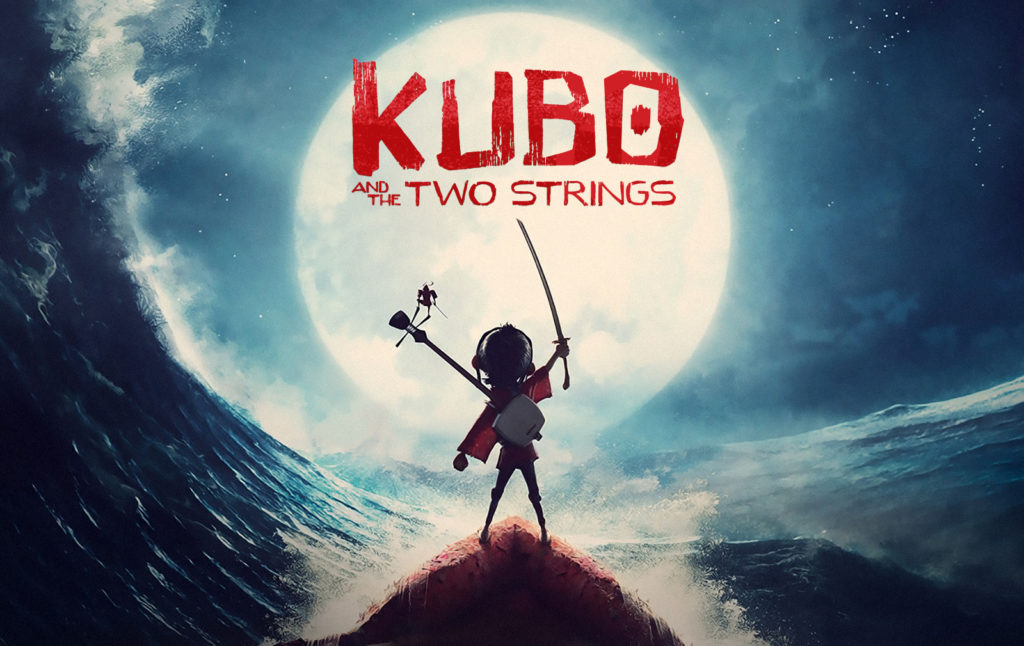
The reminder of how it came to this.
Rules recap:
In 2017, I’ve resolved to see twelve new-to-me spec fic movies in a no-doubt vain attempt at catching up with popular culture. One movie per month, the results of watching said movie discussed at the beginning of the next month. Do you all have any idea how many awesome-sounding spec fic movies there are now? Of course, you do. You’ve been watching them! Me, I’m spoiled for choice at this point. So I made some rules.
- It must be spec-fic. For review here on Spec-Chic and for myself. I just prefer it. Science Fiction, Fantasy, Horror. Even kid’s movies if they fit one of those genres!
- For the most part, the movie must be popular spec-fic. Something people around me have been talking about.
- I have to see at least a third of them in the theater, for the truest “in the moment” connection.
This month was Kubo and the Two Strings.
Why I chose it: Technically, I’d planned on April’s resolution movie being Sleight, because I do love movies with superpowers, especially ones that come at the subject obliquely. Then the timing didn’t work out. Sleight’s not out in time, and frankly may not arrive in town at all. Since I’m not much of a movie person, the idea of driving to another city? Just for a movie? Meh. Not happening.
So Kubo it was.
Kubo was always on my list to see. I’d seen the trailer in the theater and found it wonderful — it was the snow monkey, okay? I loved the snow monkey animation, which is weird because I don’t like monkeys.
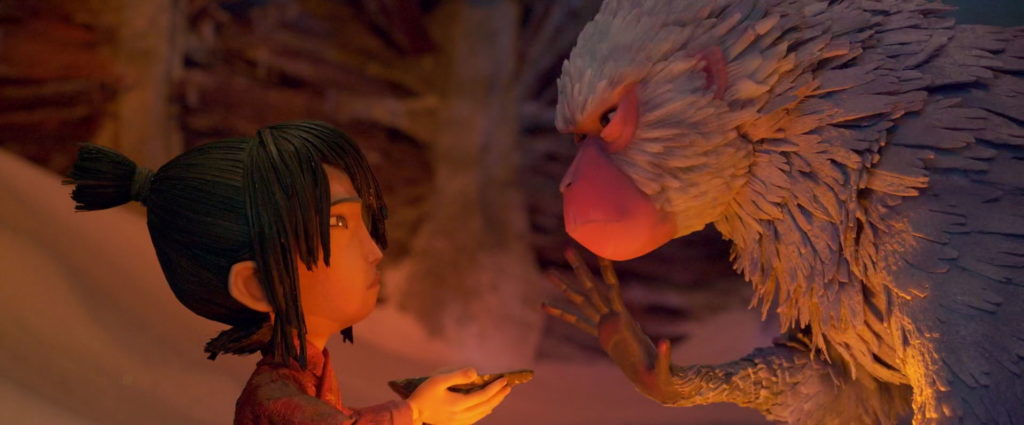
Also, this year Kubo’s been nominated for the Ray Bradbury Award for Outstanding Dramatic Presentation as part of the Nebulas.
And, on top of all that, Kubo and the Two Strings is a Laika movie created in stop-motion animation, which I love.
Why I didn’t go see it originally: As much as I love the idea of Laika movies, I’ve often been… discontent with the results. Coraline — didn’t love it. Paranorman — didn’t love it. The Corpse Bride — again, didn’t love it. Laika specializes in bittersweet and that’s an acquired taste.
Significant spoilers below.
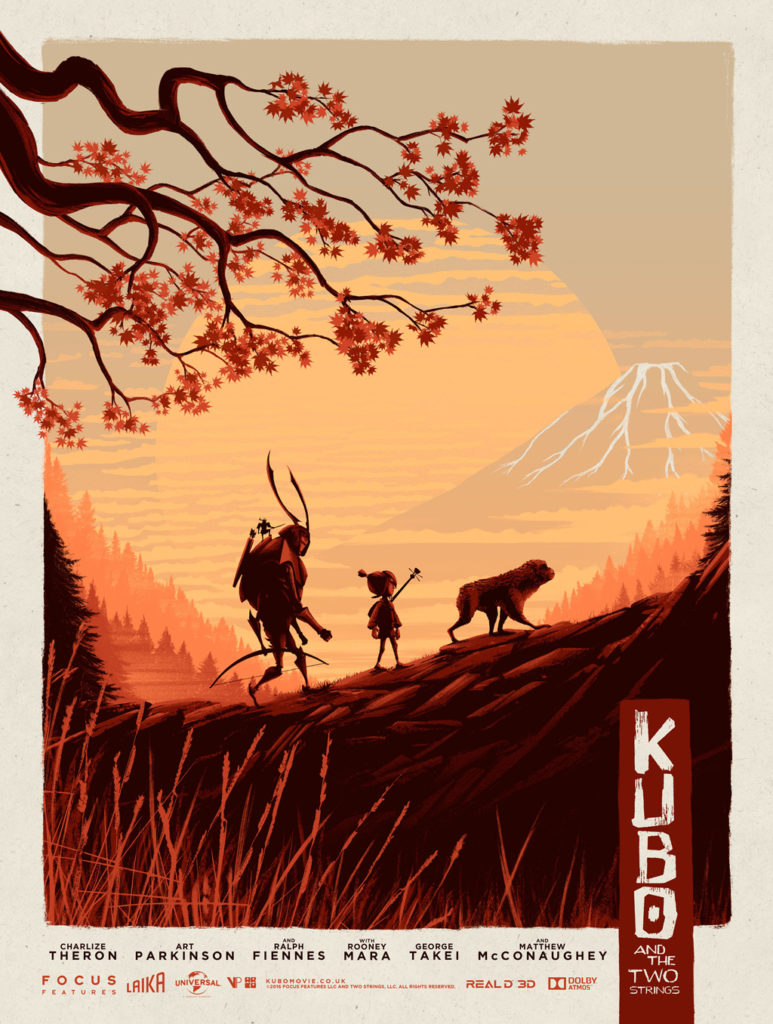
Poster by Matt Ferguson
What I think now that I’ve seen it: Bitter. Freaking. Sweet. I didn’t love it.
Okay, now that that’s out of the way, let’s actually talk about the movie.
Kubo and the Two Strings is an absolutely beautiful movie. Laika knows what they’re doing. They make a movie; you sit down to watch it and there’s a single moment of disorientation as you look at this strange world they’re presenting to you. The next moment you are completely absorbed.
I loved Kubo. He’s a wonderful mix between magical child and regular boy with regular kid wants — love, attention, security.
I loved the magic. Paper magic is always one of my favorite types of magic (how can it not be a writer’s favorite?!), and this was particularly enchanting as Kubo used it for entertaining the villagers, entertaining himself, making a small living, and you know, saving everyone. Or everyone he could.
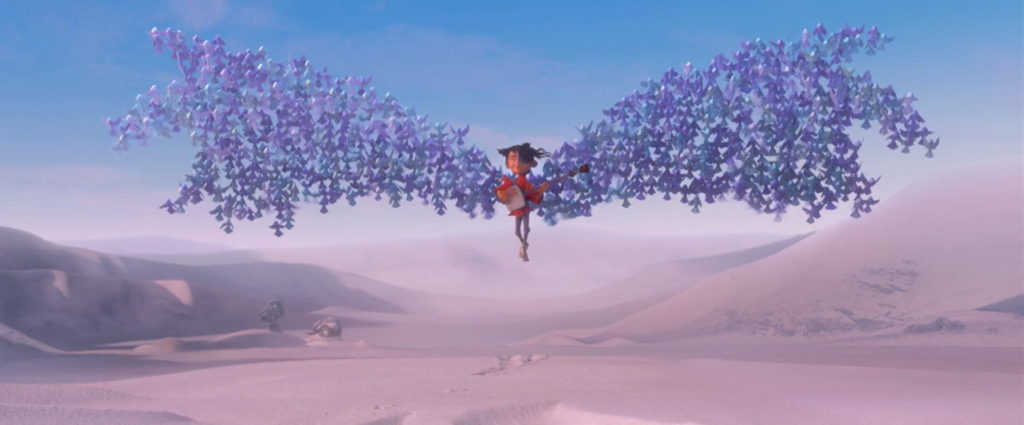
I loved a lot of the segments. Kubo makes the classic mythological blunder of staying out past dark (or past the stroke of midnight, or whatever you’ve been told not to do), endangering his life; his mother comes to his rescue, using the last of her magic to send him winging away. When he wakes, Kubo finds that his toy monkey has come to life and is seemingly hellbent on giving him grief, because she’s a “mean monkey.” I loved it; I laughed myself silly. It’s a great moment because it takes a scene that could be nothing but grim as Kubo dwells on his loss and instead slips the focus to the interaction between a sullen Kubo and an exasperated, talking, magical snow monkey.
I really enjoyed the beetle samurai. He was enormous fun both character and design-wise.
I liked that all the characters were well-rounded. Beetle could easily have been just the comic sidekick, but he’s not. Monkey could have been one-note, but she gets her own sly humor. Kubo could be endlessly heroic, but he gets to be bratty and funny and confused.
The bad guys were sufficiently bad: Kubo’s selfish, evil grandfather god, and his evil twin aunts are actually villainous and creepy. I loved their character design, and really loved the evil grandfather taking on his non-human shape. His monster self was truly gorgeous. If they made toy models of the Moon Beast, I would be there with money extended.
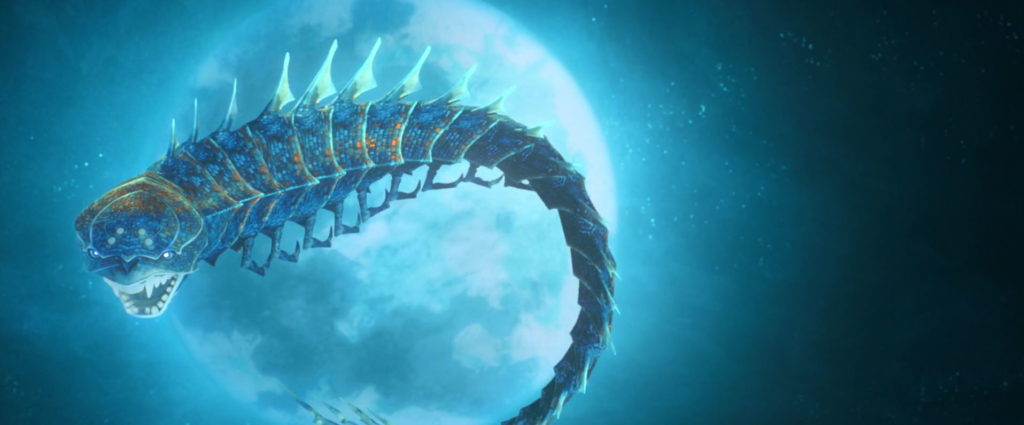
I loved that Kubo stayed true to his talents; he uses the armor but in the end, he defeats the villain through music and storytelling and magic, not force.
Then there are the things that I didn’t like, from small nitpicks to the nearly-spoiled-the-movie-for-me issues.
The minor irritant:
I couldn’t keep track of the twin aunts. As far as I could tell, there should have been one left alive to battle. Mom confronts the two of them and is killed; the two aunts survive. One of them confronts Monkey on the boat and is injured but retreats. One of them (with a cracked mask, presumably as a result of the attempt to kill Monkey on the boat) attacks them in the courtyard of Kubo’s parents’ old home and is killed. That’s one down and one left? Either one died straight off in the confrontation with Kubo’s, or one died on the boat, and I wasn’t sure. I presume it’s because it’s a kid’s movie and they didn’t want to linger over corpses. But it bugged me. I had to look it up online to find out when they had both died.
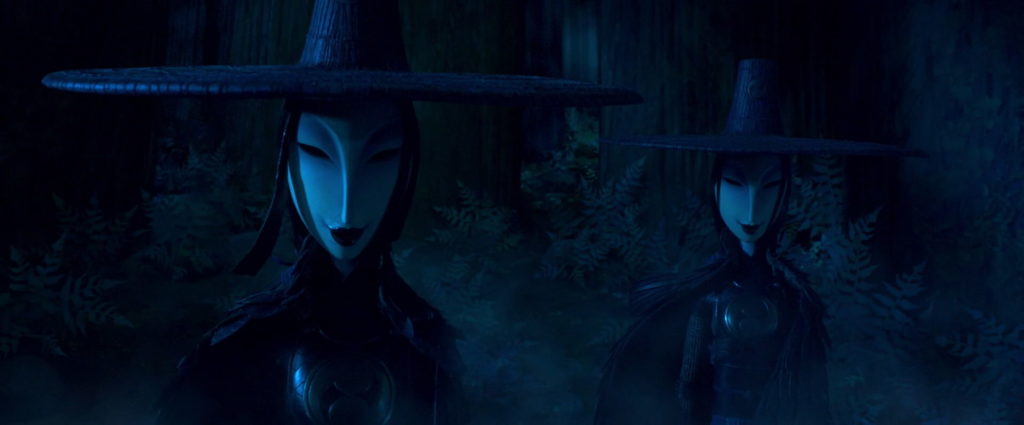
The in-between irksomeness:
There were a lot of things that felt a bit off. Monkey is cautious and careful, always looking for danger. They’ve been following Kubo’s paper samurai as a reliable guide to the magical armor. Kubo has a dream that tells him he must go in a certain direction and off they go. Monkey doesn’t object though she knows what her father is capable of — speaking to people in dreams — the paper samurai is somehow stuffed away, so he can’t object. Of course it’s a trap, and their surprise feels… dumb.
The revelatory moments — Mom as Monkey, Dad as Beetle — feel super obvious. That didn’t bug me as much as that Monkey didn’t recognize Beetle as her beloved husband. When, again, she knows what her family magic is capable of? Really, are there that many magical beetle samurai wandering around wearing your husband’s crest, Monkey Mom?
I adore revelation moments so when they feel mishandled, that makes me very sad.
I thought a lot of the story beats were predictable, which… kid’s movie, sure, with certain fairy tale rules to abide by but… I annoyed the friend I was watching the movie with by calling them out three or four scenes in advance.
The big thing I didn’t like:
I accept bittersweet. I know Laika should be praised for not shying away from consequences. That Kubo ends up an orphan is all right. That Kubo spends the last segments of the movie lighting lanterns in his parents’ memories and being tragically sad that they’re gone and that he can’t really have a purely happy ending though he does get to commune with their spirits? Bittersweet.
The problem is that Kubo gets lied to in big ways.
Monkey tells him his mother is dead, while not being dead. I understand she’s not long for the world and wanted to spare him heartbreak, but it’s still a lie that’s revealed as untrue. She is not dead. He gets to spend time with her, play with her, have a relationship with her that he’d never really had before, because of her… issues (whatever they were).
He’s told his father is dead: hey, he’s not. Admittedly, he’s a beetle with amnesia, but he’s not dead.
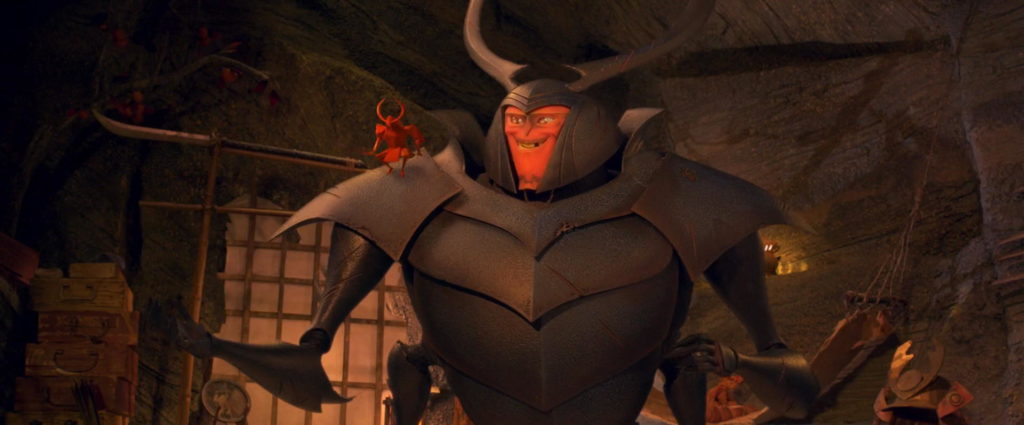
Monkey tells him his whole village is dead. Which, they’re not. They’re alive, and they help save the day.
All these lies are centered on one thing: Death is a mistake, a lie, not a real event.
So that means when we get to the end with his “dead” parents, it doesn’t feel real. Even though we saw them die. We’ve seen this lie too many times reversed.
Which means that instead of being purely sad that Kubo is trying to get his dead parents to come back, I’m irritated. The movie storytellers have laid out the rules that dead doesn’t mean dead, except now it actually does.
Thematically, it makes sense. The grandfather’s evil comes from avoiding and rejecting mortality and death. Kubo’s heroism and strength comes from accepting death — accepting that all stories have an end. Basically, you can’t be humane without being human, and you can’t be human if you’re immortal.
Except, with all the revealed not-deaths, the script doesn’t quite stick the landing. The theme wobbles.
Especially when the storyline starts pushing human memories as the most powerful magic there is, as a precursor to taking the grandfather’s memories away to turn him human? When they took Hanzo’s memories, they turned him into a beetle. Even without Hanzo’s memories, the beetle still acts in the same way Hanzo would have — honorably, kindly, paternally. So why is the grandfather now a potential good guy? If people are more than their memories, then he’s basically evil waiting to happen again. It’s a little muddled.
When I was looking up the movie summary on Wikipedia to see which sister died when, I also stumbled on this part of the summary.
“With the instrument, he is able to summon the spirits of the villagers’ loved ones, who show the Moon Beast that memories are the strongest magic of all and can never be destroyed. Kubo’s magic protects him and the villagers from the Moon Beast, eventually stripping him of his powers and leaving him a mortal human without any memories.”
You see my issue? Memories can never be destroyed! Except of course, twice in this movie. Grrrr.
All that said: do I think this movie should win the Ray Bradbury Award against its competitors?
I’m not a fair judge because I haven’t seen the contenders against Kubo. But I can say that I feel like Ray Bradbury would have loved this movie. It hits on a lot of his favorite themes — death and childhood and change and myth, and yes, that sense of bittersweet triumph. That to win doesn’t mean you come out unscathed.
I think even if I managed to see the rest of the contenders, my opinion wouldn’t change. Kubo for the win. Even if I didn’t love it.
https://www.youtube.com/watch?v=p4-6qJzeb3A
All screencaps from Disney Screencaps.

This was a movie of distractions for me. As someone who does not often see animated films if they don’t have the words “Disney” or “Pixar” in front of them, I was honestly too busy being entranced by the stop-motion animation (fur! paper! WATER!) to really care about the (significant) plot holes in the story.
The animation is unbelievable in the best ways. I adored the look of this a whole lot. I think it’s worth seeing just for the spectacle alone.
I enjoyed it a lot. Then again, I should have changed my middle name to “Bittersweet” when I had a chance
And me, I’m not even that crazy about bittersweet chocolate…. I enjoyed watching it, but the ending kind of fizzled for me. Still, it’s on netflix and I’ve watched the beginning segments more than once.
I enjoyed watching it, but the ending kind of fizzled for me. Still, it’s on netflix and I’ve watched the beginning segments more than once.
I’ve got to get around to watching this! I know it’s on Netflix, and I meant to watch it last weekend, but my husband was in a Purple Rain and The Jazz Singer mood.
It’s free and easy! I’d say you absolutely should, but I really don’t know if you’ll love it or not! I can’t remember if you prefer your movies gritty or not. I’m basing that thought on your love for Hannibal.